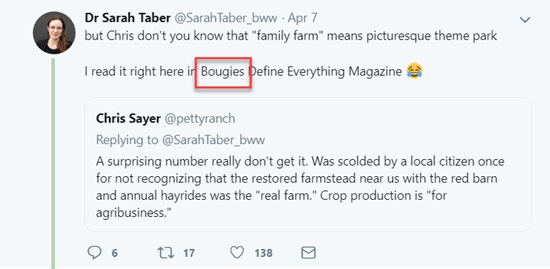The new-to-me word this week is one that could engender discussion, perhaps not all in a good way. But I'm here to learn about words, so let's see. The word is bougie and the related term boujee. I ran across bougie recently in a Twitter post by Sarah Tauber, a crop scientist, who was mocking show farms:

The word bougie was new to me, but for fun, I asked our kids, age range 20 to 31, if they knew the word. They all did. One definition offered up was "something that is fancy in a stupid way (like $18 avocado toast)." Another definition was "acting in a high class manner, with the implication that they are not high class." So that's how my kids understand the term, which is one demographic.
People seem to agree that bougie derives from bourgeoisie or bourgeois, referring to the people who lived in towns (burgs). These people were not aristocrats, nor did they work the land. Merchant class or professional class: pretty much the people we'd call middle class today.
 When I asked the kids about bougie, there was some confusion. Did I mean boujee? This is a related term, but pretty clearly from the same root. Boujee seems to have originated in the African American community, and likewise refers to trappings of an affluent lifestyle. But boujee doesn't seem to have the negative connotations that bougie does; for example, people seek to look boujee (video: How to look bad and boujee on a budget). Per a Dictionary.com article, boujee pertains to achieving material success but remaining down to earth. I found the subtlety of the distinction between the terms very interesting.
When I asked the kids about bougie, there was some confusion. Did I mean boujee? This is a related term, but pretty clearly from the same root. Boujee seems to have originated in the African American community, and likewise refers to trappings of an affluent lifestyle. But boujee doesn't seem to have the negative connotations that bougie does; for example, people seek to look boujee (video: How to look bad and boujee on a budget). Per a Dictionary.com article, boujee pertains to achieving material success but remaining down to earth. I found the subtlety of the distinction between the terms very interesting.
I should note that when you research this term, you will inevitably run across the song Bad and Boujee by Migos, which might have had some influence in spreading the term to a wide audience.
Let us move on to fun origins. I can't believe it's never occurred to me to ask—especially considering how many documents I've formatted in my career—but I only recently looked up the etymology of indent. I bet as soon as I said that you can see it already: dent is "teeth," right? As in dentist. Yes, it is.
 The verb came early ("Take hede thy mower mowe clene & holde downe the hyder hand of his sythe that he do nat endent the grasse," from a Middle Ages manual on husbandry.) The original sense is "to make tooth-like incision(s) in the edge of." Note that this definition applies to the shape of the cuts, not how they're made (by biting).
The verb came early ("Take hede thy mower mowe clene & holde downe the hyder hand of his sythe that he do nat endent the grasse," from a Middle Ages manual on husbandry.) The original sense is "to make tooth-like incision(s) in the edge of." Note that this definition applies to the shape of the cuts, not how they're made (by biting).
In the document sense, indent to mean "set back" goes back to the 17th century. A nice additional cite, courtesy of the OED: "You must indent your Line four Spaces at least." (Here we insert a joke about the ongoing debate in programming about whether to indent using spaces or tabs.)
Couple of additional thoughts. In terms of formatting documents, the verb indent spawned the verb to outdent; if indenting means setting a line back from the margin, outdenting means moving it toward the margin. You might not find the word outdent in your favorite dictionary, but it's a well-understood term in discussions about formatting.
And finally, the dent of indent is not directly related to the dent of "There's a dent in my car." To dent as in "to make a depression in" is related to dint ("by dint of"), which is a term that was kindly lent to us from Old Norse and that refers to "a stroke or blow." If you know your English history, you'll know that the Old Norsemen dealt out quite a few strokes or blows in their day. I guess that made an impression, haha.
Like this? Read all the Friday words.
 |
|

 |
|
